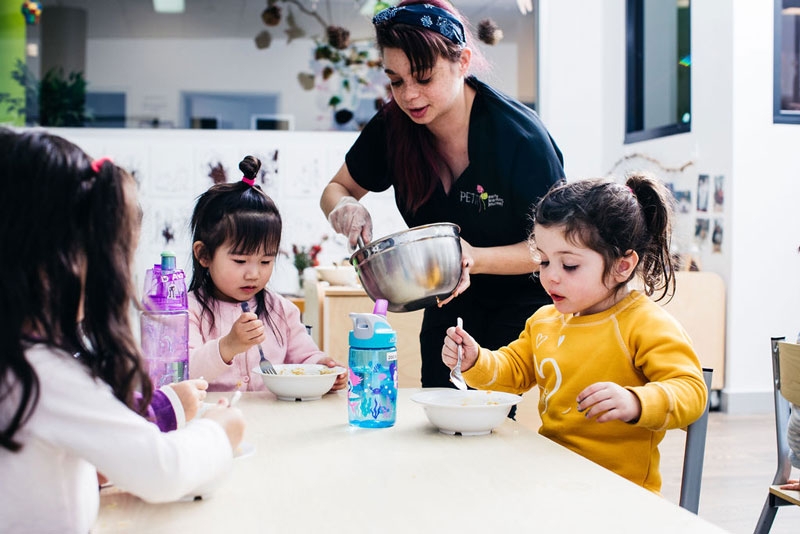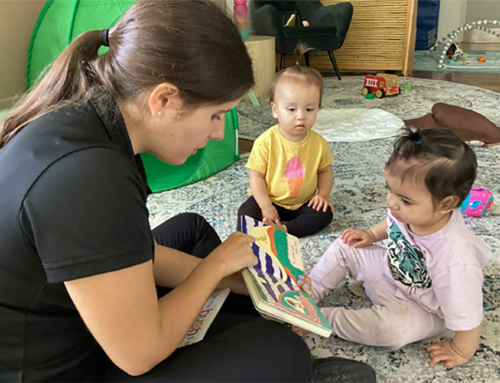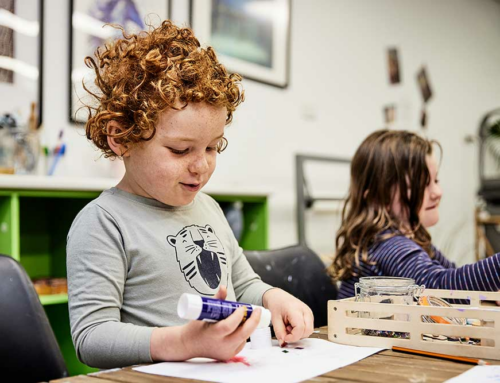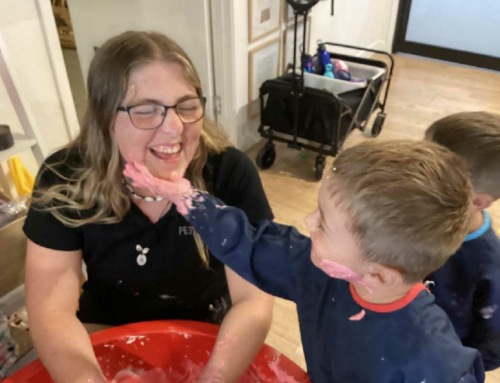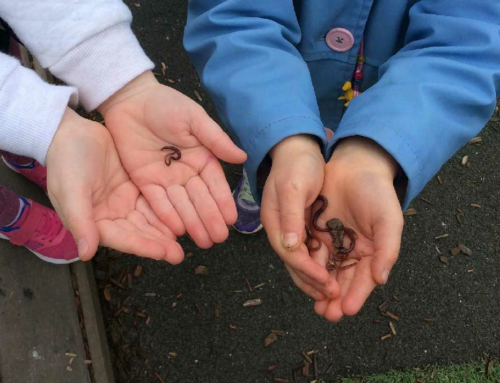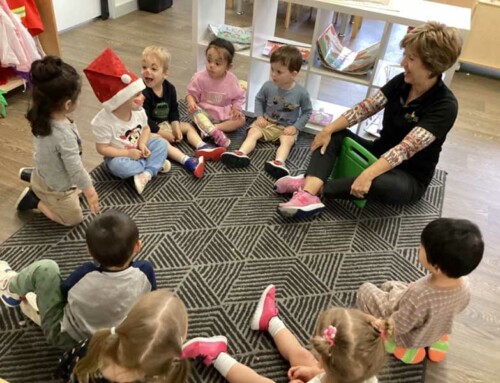When toddlers practise self-help skills, it boosts their confidence. Children are naturally inclined to want to do things for themselves. Encouraging your child’s self-care, like feeding themselves, reduces their stress and promotes their self-esteem.
Teaching your child to be self-sufficient is a gradual process. Children begin to learn new self-care skills as babies, and it continues until the day they leave home. Self-help skills encourage young children to start taking responsibility for themselves.
At Petit Early Learning Journey, we believe that every child is capable, resourceful and a constructor of their own knowledge. When we trust children to do things for themselves, they feel empowered. Their involvement contributes to growing their learning experiences.
We’ve developed a list of self-help skills to help promote your toddler’s confidence and independence and to support their sense of agency.

What are self-help skills for toddlers?
Self-help skills are abilities that children gradually attain to give them more independence. It includes getting dressed, having a shower and brushing teeth. It’s about learning life skills so they can look after themselves without depending on others.
There are four essential areas of self-help skills (also known as self-care skills):
- Self-feeding.
- Self-dressing and grooming.
- Hygiene and toileting.
- Helping with chores.
There are several self-help skills for toddlers that encourage learning and independence. Your child will develop these self-care skills gradually with repetition, practice and encouragement.
We list our self-help skills in age groups. However, every child develops differently. Some toddlers learn new abilities quickly, while others may not be ready just yet. Give your child the tools they need, show them how by role modelling, and let them choose when they’re ready.

1-year-old: Helping children to help themselves
As a 1-year-old’s coordination grows, so does their desire for autonomy. While your child may get frustrated, encourage mindfulness and give them the space to try things for themselves.
- Climbing stairs: Between 12-18 months, your child will discover the joy of climbing. They will want to climb on everything and everywhere. Climbing stairs safely while you’re present is a good skill for them to learn. Start by holding their hand. As they grow more confident, walk up the stairs behind them. Falling and tripping are natural parts of learning. Help them up and continue.
- Holding forks and spoons: Your child’s fine motor skills are strengthening, and they will begin to develop the ability to grasp crayons, pencils and paintbrushes. They may also be able to start holding a fork, spork or spoon to help them eat. Place the utensils next to their bowl and let them choose when they’re ready to use them. Seeing you use them first may be a big inspiration.
- Going down the stairs: Once a toddler has mastered going up the stairs, they’ll want to try going down the stairs. To start, encourage your child to go down the stairs, feet-first on their tummy. When they’re more confident, they can try it on their bottom.
- Holding and drinking from a sippy cup: Between 1 and 2-years-of-age, a toddler can learn to hold onto and drink from a sippy cup.
- Toilet training: For some children, potty or toilet training may begin between 18 and 24 months. Others may be nearer to 3-years before they develop an interest. Talk to your child care Educator to discuss readiness and coordinate training together.

Self-help skills for 2-year-old children
As your child’s 2nd birthday draws near, their pincer grip will strengthen, and muscle development will improve. Using a fork and spoon is now achievable. As they learn this new skill, it may be a little messy so keep those bibs handy.
- Brushing teeth: Cleaning your teeth beside your child every morning and night will help them mirror your behaviour and boost their hand-eye coordination. You may need to finish brushing their teeth so that they are cleaned well. Let them check your teeth too.
- Brushing hair: This is another skill they can learn while standing beside you in front of a mirror and mimicking your movements. Encouraging good hygiene skills is important.
- Carrying their own things: This is an excellent time for your child to learn to bring their own school bag into the studio.
- Drinking from an open cup: Sippy cups become things of the past as your child learns to use an open cup for drinking.
- Feeding themselves: They will grow more confident at feeding themselves with finger food and utensils.
- Walking themselves to places: Your child will relish walking themselves into the studio in the morning rather than being carried. It will boost their self-esteem and feeling of self-autonomy.
- Putting toys away: This is a good age to start encouraging your child to put their toys away and clean up after themselves. Your child will begin to understand simple directions like, “Put your toys away.”

Self-care skills for 3-year-olds
As children begin to interact more with other children, they will learn about turn-taking, interacting and making friends. Playing with other children will boost their independence and confidence as they learn to do things without your support.
- Wash and dry hands: Show your child how to wash their hands (you can use our hand washing songs) and explain why it is essential. Personal hygiene, smelling clean and fresh will build their self-esteem and improve their health by avoiding unnecessary infections and tummy bugs.
- Eating meals with the family: Your child will now be able to feed themselves and eat the same foods as the rest of the family, although in smaller portions. They will still be exploring their senses when it comes to food colours, textures and tastes. Invite them to help with setting their plate and utensils and simple food preparation..
- Putting clothes away: While they may not yet be able to hang clothes up, you can start teaching your child how to put away basic things, like socks and underwear. They can pick up their clothes off the floor to put in the laundry and play “fold” with socks.
- Problem-solving: Let your child try to resolve (non-harmful) difficulties by themselves. Don’t be too quick to rush in and help them. Between 3 and 4-years-of-age, your child will be learning through trial and error. Encourage a can-do attitude to boost their cognitive development and independence.
- Road safety: This is a good age to begin teaching your child road safety. With less time in the stroller, they will be strolling along pavements closer to moving cars and other vehicles. Give simple explanations to help them learn the rules.
- Blowing nose: Some children are ready to start learning how to blow their nose when they are two, while others may take longer. Blowing should be gentle, like blowing out candles on a birthday cake, except through your nose.
- Sneezing: Teach your child how to sneeze into a tissue or the crook of their elbow. They’re also old enough to learn why it’s important to avoid spraying their sneezes everywhere and onto others.
- Cleaning up their dishes: Encourage your child to scrape any leftovers and rinse their plates after eating. You can also teach them to put their bib in the dirty washing basket.
When you encourage your child to help with chores, cleaning up, and other self-care skills, it will promote their independence. Teaching toddlers self-help skills will also prepare them for their school years.
Making new friends, trying new things and doing things for themselves are essential self-help skills for school readiness.

Nourish your child’s self-help skills with Petit Early Learning Journey
At Petit ELJ, your child’s curiosity and imagination inspire their learning. We carefully design our programs and curriculum to support children’s choices and decisions, and recognise that they can initiate their own learning experiences.
Our Educators promote children’s independence and self-help skills by providing opportunities for them to participate in routine activities and encouraging self-regulation. Visit your nearest centre to discover how we can boost your child’s self-esteem and love of learning.
